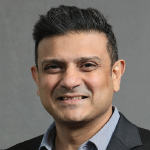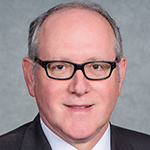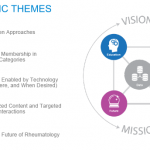
Phongphan / shutterstock.com
After months of hard work—and with insightful input from many ACR/ARP members, staff, committees and the Board of Directors—we are pleased to introduce the ACR’s 2022–27 strategic plan. This plan sets the stage for our numerous activities in the next few years and cultivates innovational approaches to support our diverse membership. This new plan will help us navigate how best to build on the many existing strengths of the ACR in these times of great scientific and technological advances, and also in light of significant challenges.
The strategic plan combines a broad, ambitious and aspirational agenda with clear, executable objectives. It sets its sights on three main areas of focus:
- New innovations in rheumatology;
- Nurturing an inclusive culture; and
- Supporting the expansion of the rheumatology workforce.
Innovations in Rheumatology
This area of focus can be summarized as “ACR is where you are.” The ACR’s goal with this focus is to create and implement nimble strategies—and invest in the accompanying technology—to provide anytime/anywhere access to the expansive suite of ACR-created educational programs and products, as well as the latest scientific advances described by expert presenters at the ACR’s annual meetings and curated rheumatology-related educational content from non-ACR sources.
Beyond providing 24/7 access to vast educational offerings, the plan notes the importance of an online platform to foster community engagement. The pandemic highlighted the need for forming and maintaining relationships, and showed us that although much of the appeal of the ACR has historically been its great in-person meetings, much of that need can be met online. The past two years also revealed that an online platform can be an excellent way to connect with new and younger members, as well as those working in rural or otherwise isolated non-academic settings.
In addition, the plan accentuates research by proposing expanded support and resources to generate research ideas, including those that explore understudied medical conditions and disparities across patient populations. It also galvanizes broadened collaborations and amplifies efforts that inspire and assist new types of investigators, such as those in community practices or in settings that lack a supportive research infrastructure.
Nurturing an Inclusive Culture
Diversity, equity and inclusion remain bedrocks of the ACR, and the plan’s second area of focus is a conscious recognition that we still have work to do to bring more voices into our membership and our leadership. Toward this end, the plan calls for better communication about the value of inclusion and engagement, while also devoting time and energy to understand what under-represented membership groups find valuable and engaging in the ACR.
The plan also calls for new ACR initiatives and opportunities for under-represented groups, including healthcare providers from racial and ethnic groups under-represented in biomedical research, those working in community practices and non-rheumatologist partner providers. Some approaches involve creating collaborative spaces, boosting ACR membership, and increasing involvement (e.g., as speakers, moderators), attendance and engagement at ACR meetings so that all perspectives, ideas and talents are represented.
Moreover, the plan seeks to encourage the ACR’s global reach. The ACR has always had international members and has participated enthusiastically in international projects. The plan acknowledges the value of these relationships and projects, and the need to make them more sustainable, multidirectional and rewarding for both the College and non-U.S.-based members. This, again, will encourage a more inclusive culture that will ultimately strengthen the ACR.
Supporting Workforce Expansion
For rheumatologists who were already facing mounting stress, such as the substantial administrative burden of electronic health records and battles over reimbursements, COVID-19 heaped on its own pressures. Many rheumatologists have experienced substantial burnout and have opted to significantly modify their work life or even leave the profession, which caused even more strain on the remaining rheumatology workforce. In response, the ACR has already established a Workforce Committee that is preparing solutions, and the new strategic plan underscores the urgent nature of this issue.
The 2022–27 strategic plan endorses several strategies to support retention and expansion of the workforce. The strategies include advocating for healthy workplace environments to reduce attrition, and expanding funding for, and interest in, adult and pediatric fellowships and advanced training programs for interprofessionals.
The plan also promotes the creation of educational offerings for non-rheumatologist medical professionals, such as internists or general practitioners in rural parts of the country. This training will allow non-rheumatologist partner providers to deliver many aspects of care, which will help with a much needed expansion of our workforce, assist rheumatology patients in managing their conditions until they can see a rheumatologist and, in turn, alleviate some of the unrealistic demands on rheumatologists.
By placing attention on these issues, the plan directly addresses challenging aspects of the workplace and notes the ACR can create tools, develop products and otherwise leverage its resources to help our members, so they can continue to deliver high-quality care to patients with rheumatic diseases.
Putting the Plan into Action
Now that the strategic plan has outlined the ACR’s priorities for the next five years, we are starting to put the plan into action. The ACR Board of Directors has sent the strategic plan to the ACR’s committees and met with the committee chairs. The Strategic Planning Task Force has provided numerous suggestions and supporting tactics to help the committees envision how they may begin to accomplish many of the plan’s objectives.
The committees are now tackling the difficult job of deciding which specific steps to take and determining how to sequence those steps, perhaps by working across committees.
As that work begins, the board is conducting its own review of the ACR’s core projects to determine where emphasis and funding may be shifted to align with the new strategic plan and enhance the ACR’s impact on our members and the profession as a whole.
In summary, the 2022–27 strategic plan presents a thoughtful road map to create an engaged, supportive and inclusive community of rheumatology professionals, using innovative technology to achieve its goals. It reflects the culmination of valuable input from members across the College, and comprehensive deliberation by the members of the Strategic Planning Task Force and Board of Directors. We look forward to the next five years, and seeing an even stronger and more diverse ACR.
 Evelyn Hsieh, MD, PhD, is an assistant professor of medicine and epidemiology, Yale School of Medicine, New Haven, Conn., and chief of rheumatology for the VA Connecticut Healthcare System. She also served as co-chair of the ACR’s Strategic Planning Task Force.
Evelyn Hsieh, MD, PhD, is an assistant professor of medicine and epidemiology, Yale School of Medicine, New Haven, Conn., and chief of rheumatology for the VA Connecticut Healthcare System. She also served as co-chair of the ACR’s Strategic Planning Task Force.
 R. Swamy Venuturupalli, MD, FACR, is a rheumatology clinician and researcher, founder of Attune Health, Beverly Hills, Calif., core faculty member of the Cedars-Sinai Medical Center, Los Angeles, rheumatology fellowship program, and associate clinical professor of medicine at the David Geffen School of Medicine, University of California, Los Angeles. He also served as co-chair of the ACR’s Strategic Planning Task Force.
R. Swamy Venuturupalli, MD, FACR, is a rheumatology clinician and researcher, founder of Attune Health, Beverly Hills, Calif., core faculty member of the Cedars-Sinai Medical Center, Los Angeles, rheumatology fellowship program, and associate clinical professor of medicine at the David Geffen School of Medicine, University of California, Los Angeles. He also served as co-chair of the ACR’s Strategic Planning Task Force.
 Kenneth G. Saag, MD, MSc, is a professor of medicine and holds the Water’s endowed chair in the Division and the Department of Medicine at the University of Alabama at Birmingham (UAB). He is the division director of clinical immunology and rheumatology, and the director of the UAB Comprehensive Arthritis, Musculoskeletal, Bone, and Autoimmunity Center. He is also the ACR’s 85th president.
Kenneth G. Saag, MD, MSc, is a professor of medicine and holds the Water’s endowed chair in the Division and the Department of Medicine at the University of Alabama at Birmingham (UAB). He is the division director of clinical immunology and rheumatology, and the director of the UAB Comprehensive Arthritis, Musculoskeletal, Bone, and Autoimmunity Center. He is also the ACR’s 85th president.
How the Plan Was Created
Creating the strategic plan was a multi-layered process designed to represent all members and stakeholders. The process began nearly a year ago, with an open call to members inviting them to serve on the Strategic Planning Task Force.
The ACR worked with McKinley Advisors to facilitate the strategic planning process, including working with the task force to gather ideas and feedback from members, and hosting multiple sessions with the task force and a specific retreat for the board of directors. The task force also collaborated with the Rheumatology Research Foundation strategic planning task force, which was concurrently developing its new strategic plan. The five-year strategic plan was presented to the ACR Board of Directors in February. After careful consideration and some constructive refinement, the Board approved the 2022–27 strategic plan.
Members of the Task Force
- Evelyn Hsieh, MD, PhD (co-chair)
- Swamy Venuturupalli, MD (co-chair)
- Roberto Caricchio, MD
- Deborah Dyett Desir, MD
- Ali Duarte Garcia, MD, MSc
- Mileka Gilbert, MD
- Kwas Huston, MD
- Virginia Reddy, MD
- Jan Richardson, FAPTA, OCS, PhD, PT
- Karina Torralba, MD, MACM
Invited guests
- Kenneth G. Saag, MD, MSc
- Barbara Slusher, MSW, PA-C
